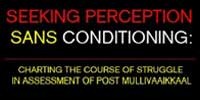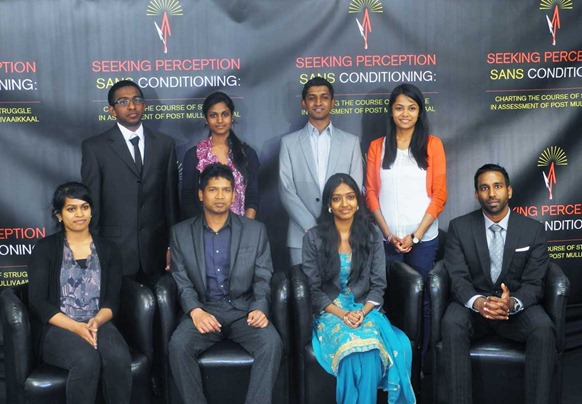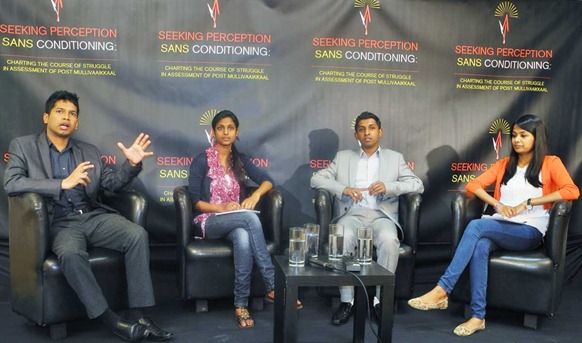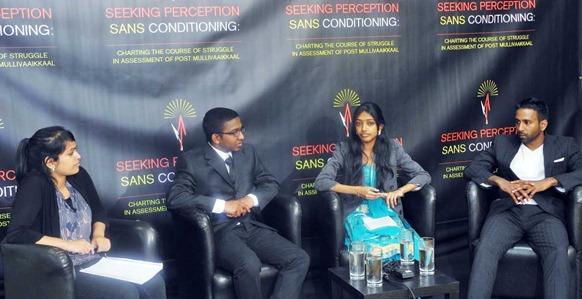 Second-generation diaspora youth activists came together to release a Policy Document to chart the course of the Eezham Tamils’ struggle, assessing political developments post- May 2009. After interactive sessions held from July 6-7 at an event titled ‘Seeking Perception sans Conditioning: Charting the Course of Struggle in Assessment of Post-Mullivaaikkaal’, eight activists from Europe, Australia and Canada asserted the need for holding the recognition of a sovereign nationhood of the Eezham Tamils as basis for a principled minimal demand of the Eezham Tamil nation, grounding it in the School of Thought of the Eezham Tamils’ struggle. Calling for a critical engagement with the International Community, the youth activists declared that Tamil organizations must be held accountable to the democratic will of the people, urging the formation of a robust Tamil civil society in the diaspora.
Second-generation diaspora youth activists came together to release a Policy Document to chart the course of the Eezham Tamils’ struggle, assessing political developments post- May 2009. After interactive sessions held from July 6-7 at an event titled ‘Seeking Perception sans Conditioning: Charting the Course of Struggle in Assessment of Post-Mullivaaikkaal’, eight activists from Europe, Australia and Canada asserted the need for holding the recognition of a sovereign nationhood of the Eezham Tamils as basis for a principled minimal demand of the Eezham Tamil nation, grounding it in the School of Thought of the Eezham Tamils’ struggle. Calling for a critical engagement with the International Community, the youth activists declared that Tamil organizations must be held accountable to the democratic will of the people, urging the formation of a robust Tamil civil society in the diaspora.
PDF: Policy Document – Perception Sans Conditioning
The two-day event held in London involved two direct-to-video sessions that saw the activists discussing crucial themes pertaining to the Eezham Tamils’ struggle post-Mu’l’livaaykkaal.
Seran Sribalan from Australia, Sasithar Maheswaran from the UK, Elackiya Rajasingam and Luxcy Lambert from Germany were the discussants in the first session.
The second session saw discussion between Sinega Puvaneswaran from Germany, Krisna Saravanamuttu from Canada, and Shanyuga Ganesan and Sathapalan Kanasalingam from the UK.
After arriving at a consensus on the assessment of the current political situation and the type of activism required, Tamils’ role in local and global geo-politics, and the basis of a principled minimal demands of the Eezham Tamil nation, the activists formulated and released a Policy Document titled ‘Findings towards a Formation of Policy’.
The full text of the released document follows:
Findings towards a Formation of Policy
A solution for the Eelam Tamil nation within a Sri Lankan unitary state is unfeasible. While Mullivaaikkaal saw one of the worst mass atrocities in the history of the Eelam Tamil nation, it is important to note that it was a flashpoint in the process of protracted genocide against the Tamils that began ever since British departure from the island of Ceylon, and that structural genocide continues at an accelerated pace in the occupied homeland of the Eelam Tamils post-Mullivaaikkaal. Given this background, it is only politically practical and ethical for representatives and activists of the Eelam Tamil nation to not accept any political solution that confers legitimacy to the unitary state of Sri Lanka.
Tamil sovereignty is the basis of a principled minimal demand of the Eelam Tamil nation. Tamil sovereignty is based on the recognition of Historical Sovereignty that the Eelam Tamils as a nation had in their traditional homeland, Earned Sovereignty that the LTTE de-facto state won in the course of the armed struggle, and Remedial Sovereignty to protect the Eelam Tamil nation from genocide in the post-Mullivaaikkaal period. A ‘step-by-step’ approach that undermines Tamil sovereignty, solutions based on the 13th Amendment, devolution, internal self-determination have failed to meet the fundamental political aspirations of the Tamil nation. In this regard, both the Indo-Sri Lanka accord framed by India in 1987 and the December 2002 Oslo Declaration created under the supervision of the US moderated co-chairs negate the aspirations of the Eelam Tamil nation. Whereas, a framework for a just political solution for the Eelam Tamils was laid in the 1985 Thimpu Talks and in the 2003 Interim Self-Governing Authority proposals charted by the LTTE governed de-facto state that was based on the recognition of sovereign Eelam Tamil nationhood.
The school of thought of the Eelam Tamils’ liberation struggle is uncompromising on a solution based on a Tamil sovereign nationhood. The political outlook of V. Navaratnam, S.J.V. Chelvanayagam and V. Pirapaharan which constitutes the school of thought of the Eelam Tamils’ liberation struggle forms the general ideological framework of Eelam Tamil nationalism and calls for a solution based on the recognition of the Eelam Tamils as a nation as different from a minority community. This school of thought was the guiding principle behind the Vaddukkodai resolution mandated by the Eelam Tamils in the homeland in 1977, re-mandated by the Tamil diaspora through polls in 2010, and also behind the de-facto state functioning of LTTE. This school of thought provides a basis towards the creation of a secular, egalitarian Tamil society and also engaging constructively with the aspirations of the Muslim peoples.
Tamils must take note of their significant role in local and global geopolitics. More than Tamils needing the West and India, these powers need the Tamils in their policy concerning the South Asian region. In terms of numbers, the Tamil Nadu Tamils and the Eelam Tamils taken together constitute a formidable bloc that forms the calculations of world powers. Taking this into account, Eelam Tamils should not be pawns of an external power’s policy but must have a very clear understanding of their policy towards the resolution of their chronic national question. The recent Tamil Nadu student uprising against the pro-LLRC US resolution in 22nd Session of the UNHRC in 2013 which compelled the Tamil Nadu state government to pass a resolution calling for a referendum among the Eelam Tamils is an example of how people’s power can effectively challenge the policy of world powers. In such a situation, an enlightened political activism in the sphere of media and information is necessary.
There must be a critical engagement with the International Community. It is unfortunate that some actors within the Tamil polity are willing to accept solutions thrust upon us by the International Community that have only reforming the Sri Lankan state or bringing about a regime change at mind. This sort of uncritical engagement has led to political failures among certain Tamil activists and organizations in venues like UNHRC, where-in they stand approving of resolutions recognizing the legitimacy of the unitary Sri Lankan state. The engagement with external actors and world powers must be critical, in that Eelam Tamils must be equal partners while placing our principled demands at the table. The International Community and the UN failed to invoke the Responsibility to Protect (R2P) in 2009 to save the Eelam Tamils from a blood bath in May, preferring instead to protect the Sri Lankan state. A genuine political gesture by the International Community towards the Eelam Tamil nation in the current period of structural genocide in our homeland would be the recognition of our right to Remedial Sovereignty.
Strategies must be framed by measuring outcomes. Taking the political and social factors in the Tamil homeland, Tamil Nadu and the Tamil diaspora into account, and the interests of local and global powers in the island into consideration it is necessary to critically assess what would be the outcome of particular courses of action in the long-run. Concomitantly, a long-term strategy based on the principled political position of the Eelam Tamils’ liberation struggle must be framed. Given the current situation, it is not enough to call for an independent international investigation into the crimes committed by the Sri Lankan state. Taking from the mass uprising in Tamil Nadu and the results they have produced, the Tamil diaspora must mobilize to convince their host countries of the necessity of an internationally monitored referendum among the Eelam Tamils in the homeland, the refugees in India, and the Tamil diaspora to determine their political future.
Tamil organizations and activists must be held accountable to the democratic will of the people. There is a need for a greater transparency regarding the policy decisions taken by diaspora organizations. People have a right to hold organizations accountable to their mandate and also have a responsibility to exercise that right. Likewise, activists and organizations should have a mechanism in place for constructive criticism to be made and operating procedures that lay down how to incorporate feedback in activism and political engagement. There should be a change among the thinking of activists that their being a representative of the people is a service which comes with accountability, and not a charity for which they need be answerable to no one. The politics of namesake organizations and puppet outfits should be intellectually challenged by a democratic process. The formation of a robust Tamil civil society in the countries where the diaspora resides is necessary for this.
SIGNED BY
Elackiya Rajasingam, Germany
Krisna Saravanamuttu, Canada
Luxcy Lambert, Germany
Sasithar Maheswaran, United Kingdom
Sathapalan Kanasalingam, United Kingdom
Seran Sribalan, Australia
Shanyuga Ganesan, United Kingdom
Sinega Puvaneswaran, Germany

Seeking Perception Sans Conditioning

Seeking Perception Sans Conditioning: Session 1

Seeking Perception Sans Conditioning: Session 2
(For updates you can share with your friends, follow TNN on Facebook and Twitter )
